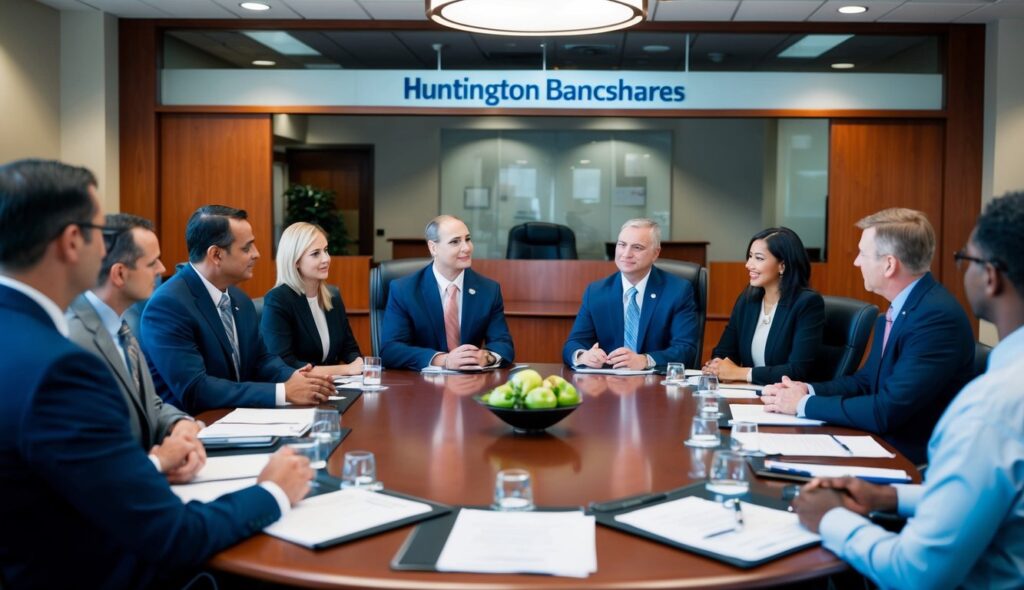130 Huntington Bancshares Interview Questions: Top Queries for Job Preparation

When preparing for an interview at Huntington Bancshares, knowing what to expect can make all the difference. You want to feel ready and confident. You might face questions about your experience and how it aligns with the company’s values and goals. This post covers 130 Interview Questions for Job at Huntington Bancshares.
Think about your skills and how they match the role you’ve applied for.

Huntington Bancshares values teamwork, customer service, and innovation. Expect questions that focus on these areas.
You could be asked how you handle customer complaints or what steps you take to solve problems in a team. Reflect on past experiences where you demonstrated these skills.
Understanding the company culture is equally important. Familiarize yourself with Huntington Bancshares mission and recent achievements. Being informed shows that you’re genuinely interested in working with them and can help set you apart from other candidates. Take some time to research and think about why you want to be part of their team.
Understanding Huntington Bancshares

Huntington Bancshares focuses on community involvement through services like personal banking and insurance. Integrity and teamwork are key to their success.
Values and Culture
Huntington Bank emphasizes integrity by prioritizing honest and transparent business practices. This builds trust with customers, especially in personal banking services. Customers count on the bank to manage their savings and investments reliably.
Teamwork is another vital value. Employees collaborate closely to ensure customer satisfaction. Whether you are handling accounts or exploring insurance options, the team works together to meet your needs. This approach fosters a supportive and efficient work environment that centers around strong customer relationships.
Preparing for Huntington Bancshares Interview
To excel in your Huntington Bank interview, you should focus on researching the specific role, understanding the job description, and reviewing your resume. Each step contributes to presenting yourself as a well-prepared candidate.
Researching the Role
Knowing the role you are applying for is crucial. Start by learning about Huntington Bank and its culture. Visit the company’s website to understand its core values and services. Explore recent news articles that mention the bank to know about any updates or changes.
List down key responsibilities of the role. This will help you align your skills with what the job requires. Look for any specific tools or technologies that the job may involve.
Understanding the Job Description
Carefully read the job description. Highlight essential duties and requirements mentioned. Pay attention to the skills that are listed as necessary or preferred for the position.
This will guide you on what areas to focus on during your preparation.
Match these skills with your experience. Prepare examples from your past work that demonstrate your abilities in these areas. This will help you talk confidently about your qualifications during your interview.
Reviewing Your Resume
A well-organized resume is key. Ensure that it reflects recent experiences and achievements. Double-check for any grammatical errors or typos. Your resume should clearly indicate your education and work history relevant to the job at Huntington Bank.
Tailor your resume to the job you are applying for. Focus on the skills and tasks that are most relevant to the interview. This customization shows attention to detail and dedication.
By following these steps, you will position yourself as a strong candidate for a role at Huntington Bank.
Sample Brain Teaser Questions for Interview

Interviews at Huntington Bancshares may include different questions. These can fall into several categories such as behavioral, technical, and customer service queries. They help determine how candidates solve problems, handle customer demands, and apply technical knowledge.
Behavioral Questions
Behavioral questions focus on how you react to challenges, work with others, or lead a team. These questions are designed to predict future behavior based on past experiences.
- Describe a time you solved a difficult problem.
- How do you handle stress at work?
- Tell me about a time you had to learn something new quickly.
- Share an example of a goal you set and achieved.
- Describe a situation where you had to work with a difficult person.
- How do you manage multiple priorities?
- Have you ever had to make an unpopular decision?
- Tell me about a time you disagreed with a coworker.
- How do you address conflicts within a team?
- Describe an experience where you took initiative.
Technical Questions
Technical questions assess your problem-solving skills and technical knowledge. You might encounter questions related to specific technologies, programming, or your analytical abilities.
- How do you approach solving a programming error?
- Explain a technical project you worked on.
- Describe the most challenging technical problem you’ve solved.
- How do you prioritize different bugs or issues?
- What programming languages are you familiar with?
- How do you ensure your technical skills stay updated?
- Can you explain a complex technical process in simple terms?
- What steps do you follow when debugging code?
- Have you ever worked with data analysis tools?
- Describe a successful project you led.
Customer Service Queries: Huntington Bancshares
Customer service questions determine how well you serve customers and address their needs. These queries are a critical part of Huntington Bank interviews to evaluate your ability to maintain excellent customer service.
- How do you handle a complaint from a customer?
- What methods do you use to ensure customer satisfaction?
- Describe a time when you turned an unhappy customer into a happy one.
- How do you prioritize customer requests?
- Tell me about a particularly challenging customer interaction.
- What does providing excellent customer service mean to you?
- How would you deal with an irate customer over the phone?
- Can you describe a situation where you exceeded customer expectations?
- How do you manage time between multiple customers?
- What steps do you take to stay calm during stressful customer interactions?
List of 130 Interview Questions Huntington Bancshares

When preparing for an interview with Huntington Bancshares, it’s useful to anticipate possible questions. It’s essential to stay ready for both common and unique questions.
- Tell me about yourself.
- I have a degree in Finance and over five years of experience in the banking sector. I started my career as a teller and worked my way up to a customer service representative, where I honed my skills in client relations and financial advising. I’m passionate about helping clients achieve their financial goals and am excited about the opportunity to contribute to Huntington Bancshares.
- Why do you want to work for Huntington Bancshares?
- I admire Huntington Bancshares for its commitment to community involvement and customer service. Your focus on building long-term relationships aligns with my personal values, and I believe my skills in financial analysis and customer relations would be a great fit for your team.
- What do you know about our company?
- Huntington Bancshares is a regional bank headquartered in Columbus, Ohio. It provides a variety of financial services, including retail banking, commercial banking, and wealth management. I appreciate your emphasis on customer service and community engagement, as well as your innovative approach to banking technology.
- Describe your experience in the banking industry.
- I have worked in the banking industry for over five years, starting as a teller and then moving into a customer service role. In my current position, I assist clients with their banking needs, provide financial advice, and help them understand the products available to them.
- How do you handle stress and pressure?
- I handle stress by staying organized and prioritizing my tasks. When I feel overwhelmed, I take a moment to breathe and refocus. I also find that maintaining open communication with my team helps alleviate pressure, as we can support each other during busy times.
- What are your strengths and weaknesses?
- One of my strengths is my ability to build rapport with clients quickly, which has helped me achieve high customer satisfaction scores. A weakness I’m working on is my tendency to take on too much at once; I’m learning to delegate tasks and ask for help when needed.
- Why should we hire you?
- I believe my background in finance, combined with my strong customer service skills and commitment to teamwork, makes me an ideal candidate for this position. I am dedicated to helping clients and am eager to contribute to the success of Huntington Bancshares.
- Describe a challenging situation you faced at work and how you handled it.
- In my previous role, I faced a situation where a major system outage affected our ability to process transactions. I quickly communicated with my team and customers, keeping everyone informed and providing alternatives. We managed to minimize disruption and maintain customer trust.
- How do you prioritize your work?
- I prioritize my work by assessing deadlines and the impact of each task. I use a to-do list and often categorize tasks into urgent, important, and less critical. This helps me stay focused on what needs to be done first.
- What is your approach to teamwork?
- I believe effective teamwork requires open communication, mutual respect, and collaboration. I actively listen to my teammates’ ideas and feedback and encourage a supportive environment where everyone feels valued.
- How do you ensure accuracy in your work?
- I double-check my work and use checklists to ensure I don’t miss any important details. I also take my time to review documents before submission, which helps minimize errors.
- Describe a time when you had to meet a tight deadline.
- There was a time when I had to prepare a financial report with only 24 hours’ notice. I organized my work into manageable sections, focused on the most critical data first, and communicated with my manager about my progress. I completed the report on time and received positive feedback.
- How do you stay organized?
- I use digital tools like calendars and task management apps to keep track of my responsibilities. I also set aside time each week to review my goals and adjust my priorities as needed.
- What is your experience with financial analysis?
- I have conducted financial analysis in my previous roles, where I analyzed customer data to identify trends and recommend products. I am proficient in using Excel for data analysis and reporting.
- How do you handle difficult customers?
- I approach difficult customers with empathy and patience. I listen to their concerns, validate their feelings, and work towards finding a solution that meets their needs while adhering to company policies.
- What do you consider to be excellent customer service?
- Excellent customer service involves understanding the customer’s needs, providing timely and accurate information, and going the extra mile to ensure their satisfaction. It’s about building trust and creating a positive experience.
- Describe a time when you went above and beyond for a customer.
- A customer once needed urgent assistance with a loan application. I stayed late to ensure all documents were processed correctly and even followed up with them the next day to ensure everything was on track. They appreciated my dedication and referred others to our branch.
- How do you keep up with changes in the banking industry?
- I subscribe to industry newsletters, attend webinars, and participate in professional groups. This helps me stay informed about new regulations, technologies, and best practices in banking.
- What software or tools are you proficient in?
- I am proficient in Microsoft Office Suite, particularly Excel and PowerPoint. I also have experience with banking software like X and Y tools that help manage customer relationships.
- How do you approach problem-solving?
- I approach problem-solving by first identifying the issue and gathering relevant information. I then brainstorm potential solutions, evaluate their pros and cons, and choose the best course of action while considering input from my team.
- Describe your leadership style.
- My leadership style is collaborative. I believe in empowering my team members by encouraging their input and fostering an environment where everyone feels comfortable sharing ideas. I also provide support and guidance to help them achieve their goals.
- How do you handle conflict within a team?
- I address conflict by facilitating open discussions between the parties involved. I aim to understand different perspectives and help find a resolution that is acceptable to everyone. It’s important to maintain a respectful and constructive dialogue.
- What motivates you in your work?
- I am motivated by the opportunity to help others achieve their financial goals. I find fulfillment in building relationships with clients and seeing the positive impact of my work on their lives.
- How do you define success?
- I define success as achieving my goals while positively impacting others. In a professional context, it means meeting targets, contributing to team objectives, and ensuring customer satisfaction.
- Tell me about a time you made a mistake and how you handled it.
- I once miscalculated a financial report, which led to incorrect data being shared with management. I immediately acknowledged the error, corrected it, and communicated transparently with my supervisor. I also implemented a new review process to prevent similar mistakes in the future.
- What are your career goals?
- My career goal is to advance into a leadership position within the banking industry where I can influence strategy and support team development. I also aim to enhance my skills in financial analysis and customer relationship management.
- How do you handle feedback and criticism?
- I view feedback as an opportunity for growth. I listen carefully, ask clarifying questions if needed, and reflect on how I can improve. I appreciate constructive criticism and use it to enhance my performance.
- Describe a successful project you worked on.
- I led a project to streamline our loan application process, which involved collaborating with multiple departments. By implementing new software and training staff, we reduced processing time by 30%, leading to increased customer satisfaction.
- What do you think is the biggest challenge facing the banking industry today?
- One of the biggest challenges is the rapid advancement of technology and the need for banks to adapt to digital transformation. Staying competitive while ensuring security and compliance is crucial.
- How do you build relationships with clients?
- I build relationships by being approachable, actively listening, and understanding their needs. I follow up regularly and provide personalized service, which helps foster trust and loyalty.
- What is your experience with compliance and regulatory issues?
- I have worked closely with compliance teams to ensure that our branch adheres to banking regulations. I am familiar with policies related to anti-money laundering and know the importance of maintaining accurate records.
- How do you approach risk management?
- I approach risk management by identifying potential risks early and assessing their impact. I believe in implementing preventive measures and regularly reviewing processes to mitigate risks effectively.
- Describe a time you had to adapt to a significant change at work.
- When our bank implemented a new software system, I had to quickly learn the new features and train my colleagues. I embraced the change by attending training sessions and helping others navigate the transition smoothly.
- How do you ensure confidentiality in your work?
- I follow company policies regarding data protection and confidentiality. I ensure that sensitive information is only shared with authorized personnel and use secure methods for handling client data.
- What is your experience with sales in a banking context?
- I have experience in cross-selling banking products to customers based on their needs. I focus on understanding their financial goals and recommending appropriate solutions, which has resulted in increased sales at my previous job.
- How do you handle multiple tasks at once?
- I prioritize tasks based on urgency and importance. I break down larger projects into smaller tasks and use time management techniques, such as the Pomodoro Technique, to stay focused and productive.
- What do you know about our products and services?
- I know that Huntington Bancshares offers a wide range of products, including personal and business banking, loans, mortgages, and wealth management services. I appreciate your commitment to providing tailored solutions for customers.
- How do you assess your performance?
- I assess my performance through regular self-evaluation and feedback from my supervisor. I set specific, measurable goals and track my progress, adjusting my strategies as needed to improve outcomes.
- Describe a time when you had to persuade someone to see things your way.
- I once had to convince a client to consider a different investment product that better suited their risk profile. I presented data and case studies to illustrate the potential benefits, and they ultimately agreed to my recommendation.
- What do you believe makes a great leader?
- A great leader is someone who inspires and motivates their team, leads by example, and fosters a culture of collaboration. They should also be approachable, open to feedback, and willing to invest in the development of their team members.
- How do you contribute to a positive work environment?
- I contribute to a positive work environment by being supportive and encouraging my colleagues. I celebrate team achievements and promote open communication, which helps create a collaborative atmosphere.
- Describe your experience with budgeting and forecasting.
- I have experience in preparing budgets and financial forecasts for my department. I analyze historical data and market trends to project future performance, ensuring that we align our resources effectively.
- How do you approach networking?
- I approach networking as an opportunity to build genuine relationships. I attend industry events, engage on professional platforms like LinkedIn, and follow up with contacts to maintain connections.
- What is your experience with loan processing?
- I have worked closely with loan processing teams in my previous roles, assisting in gathering necessary documentation, verifying information, and ensuring compliance with regulatory requirements. I understand the importance of accuracy and timeliness in this process, which directly impacts customer satisfaction and the bank’s reputation.
- How do you keep your skills updated?
- I keep my skills updated by participating in relevant training sessions, attending industry conferences, and pursuing certifications such as the Certified Financial Planner (CFP) designation. I also read industry publications and follow financial news to stay informed about trends and best practices.
- Describe a time when you had to work with a difficult coworker.
- I once worked on a project with a coworker who had a very different communication style. To address this, I initiated a one-on-one conversation to understand their perspective and share my own.
- By finding common ground and agreeing on a communication method that worked for both of us, we were able to collaborate effectively and complete the project successfully.
- What are your thoughts on teamwork versus individual work?
- I believe both teamwork and individual work have their place in a successful organization. Teamwork fosters collaboration and innovation, while individual work allows for personal accountability and focus. I appreciate environments that encourage both, as they can complement each other well.
- How do you handle tight deadlines?
- When faced with tight deadlines, I prioritize my tasks, break them down into manageable steps, and maintain open communication with my team.
- I focus on essential tasks first and am not afraid to ask for help or delegate when necessary to meet the deadline.
- Describe a time you had to learn something quickly.
- When our bank transitioned to a new customer relationship management (CRM) system, I had to learn its features quickly to assist my clients effectively.
- I dedicated extra hours to training sessions, practiced using the system, and sought help from colleagues who were more familiar with it. This proactive approach allowed me to become proficient in the new system in a short period.
- What questions do you have for us?
- I’d love to know more about the team I would be working with and the culture at Huntington Bancshares.
- Additionally, what opportunities for professional development does the company offer? Finally, how does Huntington measure success for this position?
- How do you handle change in the workplace?
- What do you believe is the most important quality for someone in this role?
- Can you describe your experience with customer relationship management (CRM) systems?
- How do you approach setting and achieving goals?
- Describe a time when you had to deliver bad news to a client.
- How do you ensure compliance with company policies?
- What strategies do you use to manage your time effectively?
- How do you approach training new employees?
- Describe a time when you contributed to a team’s success.
- What do you think sets Huntington Bancshares apart from its competitors?
- How do you stay motivated during repetitive tasks?
- What role do you typically take on in group projects?
- How do you handle a situation where you disagree with your supervisor?
- What are your thoughts on work-life balance?
- How do you assess customer needs?
- Describe your experience with investment products.
- How do you respond to a client who is unhappy with a service?
- What techniques do you use to improve your sales skills?
- How do you approach market research?
- Describe a time when you had to make a difficult decision.
- How do you ensure effective communication with clients?
- What are your thoughts on continuous improvement in the workplace?
- How do you handle competing priorities?
- Describe your experience with financial planning.
- How do you keep track of industry trends?
- What do you consider your biggest professional achievement?
- How do you approach networking with professionals in your field?
- Describe a time when you had to mentor someone.
- How do you ensure that you meet customer expectations?
- What strategies do you use for effective negotiation?
- How do you handle confidential information?
- Describe a time when you had to analyze complex data.
- What do you think is the most important factor in customer retention?
- How do you approach setting priorities for your team?
- Describe your experience with digital banking tools.
- How do you manage stress during peak business periods?
- What do you believe is the key to successful project management?
- How do you encourage team collaboration?
- Describe a time when you had to adapt your communication style.
- How do you approach conflict resolution?
- What are your thoughts on the future of banking?
- How do you evaluate the effectiveness of a marketing campaign?
- Describe your experience with loan underwriting.
- How do you approach customer feedback?
- What steps do you take to ensure a positive customer experience?
- How do you handle a high-volume workload?
- Describe a time when you had to work under minimal supervision.
- What do you think is the biggest risk in the banking industry?
- How do you keep your team motivated?
- Describe your experience with compliance audits.
- How do you approach training and development for yourself?
- What is your experience with cross-selling banking products?
- How do you evaluate potential business opportunities?
- Describe a time when you improved a process at work.
- How do you handle a situation where a client is not following through?
- What do you believe is the most important aspect of financial literacy?
- How do you stay organized when managing multiple projects?
- Describe your experience with customer segmentation.
- How do you approach goal-setting with your team?
- What role does technology play in your work?
- How do you ensure that you meet regulatory requirements?
- Describe a time when you had to lead a project.
- How do you approach personal and professional development?
- What do you think is the most significant trend in the banking industry today?
- How do you handle a situation where you need to make a quick decision?
- Describe your experience with business development.
- How do you assess the creditworthiness of a customer?
- What are your thoughts on ethical banking practices?
- How do you approach relationship management with key clients?
- Describe a time when you had to persuade a team to adopt a new strategy.
- How do you handle setbacks in your work?
- What do you consider the most challenging aspect of working in banking?
- How do you ensure that your team meets its targets?
- Describe your experience with performance metrics.
- How do you manage client expectations?
- What is your approach to developing a sales strategy?
- How do you keep your knowledge of financial regulations current?
- Describe a time when you had to collaborate with other departments.
- How do you approach customer onboarding?
- What are your long-term career aspirations in the banking industry?
Prepare your responses by considering your past experiences. Practicing your answers can help boost your confidence.
Frequently Asked Questions: Huntington Bancshares

Interviewing at Huntington Bancshares involves understanding the types of questions you might face and how to express your interest in the company. It’s also important to know the hiring process, how to prepare for an interview, and how to describe your plan if hired.
What types of questions are typically asked during an interview at Huntington?
You can expect a mix of behavioral and technical questions. Interviewers often want to know about your past experiences, how you handle challenges, and your problem-solving skills. Technical questions may relate to the specific role you are applying for.
Why are you interested in working at Huntington Bancshares?
When asked this, focus on what attracts you to the company. Talk about its values, culture, and the opportunities it offers that align with your career goals. Show that you have researched the company and understand its mission.
Can you describe the hiring process at Huntington Bancshares?
The hiring process usually starts with an online application. If selected, you might have a phone or video interview, followed by in-person interviews. The process can vary depending on the position. Keep an eye on communication from the HR team.

How should one prepare for an internship interview at Huntington Bancshares?
Start by researching the company and understanding its operations. Review the internship description and relate it to your skills. Practice common interview questions and be ready to discuss your academic projects or any relevant work experience.
Can you explain the 30-90 day plan you would implement if hired at Huntington?
A 30-60-90 day plan should outline your goals for the first three months. In the first 30 days, focus on learning and integrating into the team. In the next 30 days, start contributing to projects. By the 90-day mark, aim to make significant impacts and propose improvements.
All the Best !






